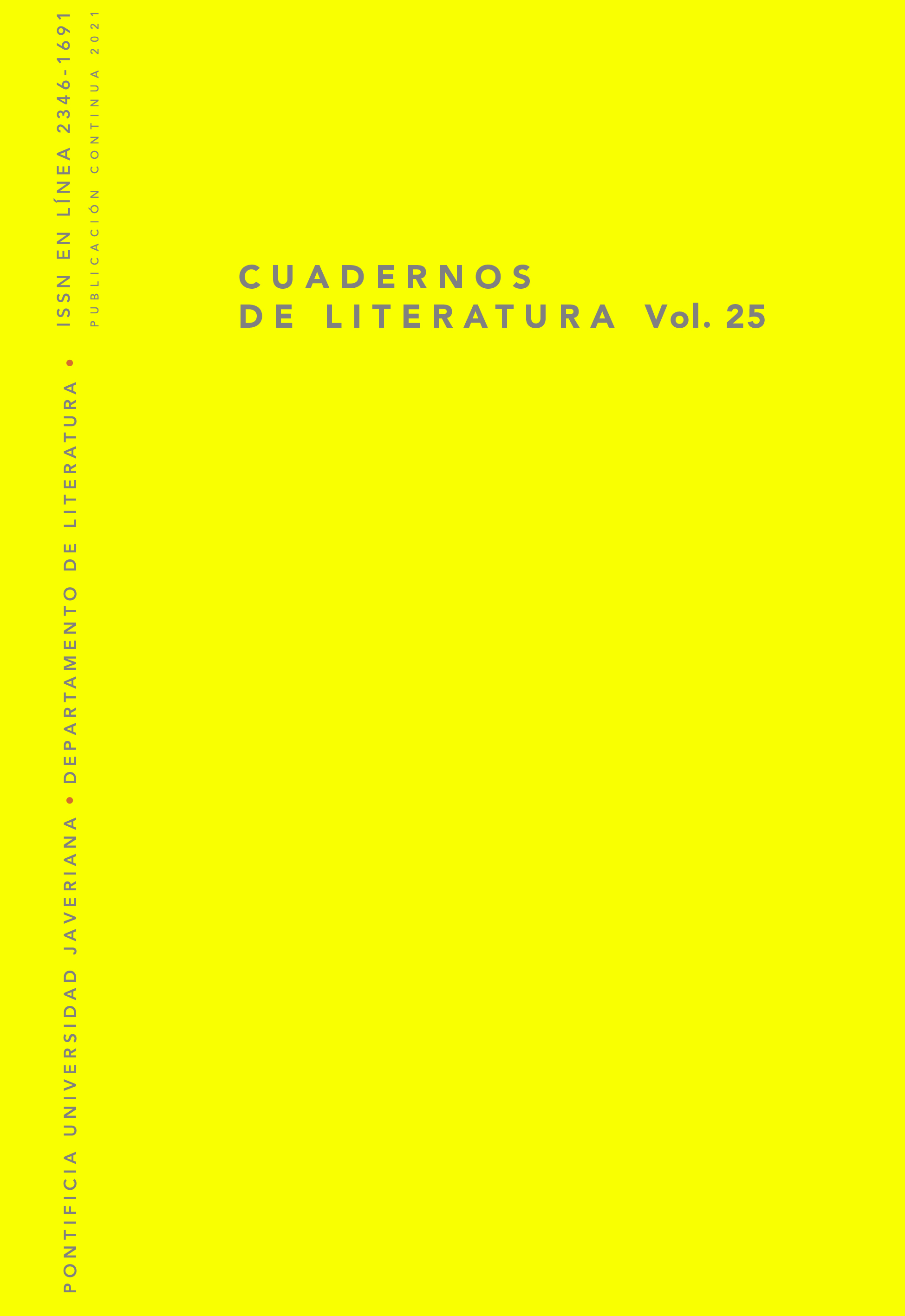Resumo
Este trabajo examina los escritos de tres autores caribeños decimonónicos que abordaron la esclavitud y la raza en sus obras: la narrativa de Mary Prince, una mujer esclavizada; el relato de viaje de la jamaiquina Mary Seacole, y la obra inicial del cubano Martín Morúa Delgado. Se analiza su relación con la esfera pública en un período en el cual las personas de color en el Caribe fueron mayoritariamente excluidas de los debates letrados que giraban en torno a la esclavitud. La investigación se enmarca en las teorías de la esfera pública y de los contrapúblicos, y dialoga con la periodización de la esfera pública caribeña propuesta por Raphael Dalleo.
Allen, Jennifer L. “Pringle’s Pruning of Prince: The History of Mary Prince and the Question of Repetition”. Callaloo, vol. 35, n.º 2, 2012, pp. 509-519.
Andrews, William L. “Introduction”. Wonderful Adventures of Mrs. Seacole in Many Lands, por Mary Seacole, Oxford University Press, 1988, pp. xxvii-xxxiv.
Baeza Flores, Alberto. “Notas”. Integración cubana y otros ensayos. Obras completas de Martín Morúa Delgado. Tomo III, Comisión Nacional del Centenario de Don Martín Morúa Delgado, 1957.
Baker, Houston A. “Critical Memory and the Black Public Sphere”. The Black Public Sphere: A Public Culture Book, editado por The Black Public Sphere Collective, University of Chicago Press, 1995, pp. 5-38.
Brooks, Joanna. “The Early American Public Sphere and the Emergence of Black Print Culture”. The William and Mary Quarterly, vol. 62, n.º 1, 2005, pp. 67-92, www.jstor.org/stable/3491622.
Bush, Barbara. Slave Women in Caribbean Society: 1650-1838. Indiana University Press, 1990.
Chang, Tan Feng. “Creolizing the White Woman’s Burden: Mary Seacole Playing ‘Mother’ at the Colonial Crossroads between Panama and Crimea”. College Literature: A Journal of Critical Literary Studies, vol. 44, n.º 4, 2017, pp. 527-557, doi:10.1353/lit.2017.0033.
Cobb, Martha K. “Martin Morua Delgado”. Negro History Bulletin, vol. 36, n.º 1, 1973, p. 12, www.jstor.org/stable/44175494.
Craig, Christine. “Wonderful Adventures of Mrs. Seacole in Many Lands: Autobiography as literary genre and a window to character”. Caribbean Quarterly, vol. 30, n.º 2, 1984, pp. 33-47, https://www.jstor.org/stable/40653534.
Dalleo, Raphael. Caribbean Literature and the Public Sphere: From the Plantation to the Postcolonial. University of Virginia Press, 2011.
De la Fuente, Alejandro. “Myths of Racial Democracy: Cuba, 1900-1912”. Latin American Research Review, vol. 34, n.º 3, 1999, pp. 39-73, https://www.jstor.org/stable/2503962.
Ferguson, Moira. “Introduction to the Revised Edition”. The History of Mary Prince, A West Indian Slave. As Related by Herself, editado por Moira Ferguson, University of Michigan Press, 1997, pp. 1-51.
Fraser, Nancy. “Rethinking the Public Sphere: A Contribution to the Critique of Actually Existing Democracy”. Social Text, n.º 25/26, 1990, pp. 56-80, www.jstor.org/stable/466240.
Habermas, Jürgen. The Structural Transformation of the Public Sphere: An Inquiry into a Category of Bourgeois Society. Traducido por Thomas Burger, MIT Press, 1989.
Herrera McElroy, Onyria. “Martín Morúa Delgado, precursor del afro-cubanismo”. Afro-Hispanic Review, vol. 2, n.º 1, enero de 1983, pp. 19-24, www.jstor.org/stable/23052824.
Luis, William. Literary bondage: Slavery in Cuban Narrative. Kindle. University of Texas Press, 1990.
MacQueen, James. “The Colonial Empire of Great Britain”. Blackwood’s Magazine, vol. 30, noviembre de 1831, pp. 744-764.
Mercer, Lorraine. “I Shall Make No Excuse: The Narrative Odyssey of Mary Seacole”. Journal of Narrative Theory, vol. 35, n.º 1, 2005, pp. 1-24, https://www.jstor.org/stable/30224618.
Molloy, Silvia. Acto de presencia: la escritura autobiográfica en Hispanoamérica. Traducido por José Esteban Calderón, Colegio de México / Fondo de Cultura Económica, 2001.
Morúa Delgado, Martín. “Sofía”. Obras completas de Martín Morúa Delgado, tomo I, Comisión Nacional del Centenario de Don Martín Morúa Delgado, 1957.
---. “Integración cubana y otros ensayos”. Obras completas de Martín Morúa Delgado, tomo III, Comisión Nacional del Centenario de Don Martín Morúa Delgado, 1957.
Paravisini-Gebert, Lizabeth. “Mrs. Seacole’s Wonderful Adventures in Many Lands and the Consciousness of Transit”. Black Victorians/Black Victoriana, editado por Gretchen Holbrook Gerzina, Rutgers Univerity Press, 2003, pp. 71-87, https://vassar.academia.edu/LizabethParavisiniGebert.
Poon, Angelina. “Comic acts of (be)longing: Performing Englishness in Wonderful Adventures of Mrs. Seacole in Many Lands”. Victorian Literature and Culture, vol. 35, n.º 2, 2007, pp. 501-516, doi:10.1017/S1060150307051601.
Prince, Mary. The History of Mary Prince, A West Indian Slave. Related by Herself, editado por Henry Louis Gates, Jr., Signet Classics, 2002, pp. 253-288.
---. The History of Mary Prince, A West Indian Slave. As Related by Herself, editado por Moira Ferguson, University of Michigan Press, 1997.
Pringle, Thomas. Preface. The History of Mary Prince, A West Indian Slave. As Related by Herself. The Classic Slave Narratives, editado por Henry Louis Gates, Jr., Signet Classics, 2002, pp. 251-252.
---. Supplement to the History of Mary Prince by the Editor. The History of Mary Prince, A West Indian Slave. As Related by Herself, editado por Henry Louis Gates, Jr., Signet Classics, 2002, pp. 289-316.
Rama, Ángel. La ciudad letrada. Arca, 1998.
Rodríguez Ochoa, Yoel. “Martín Morúa Delgado y la integración nacional en Cuba”. Estudios históricos, año 9, n.º 18, 2017, pp. 1-14, http://www.estudioshistoricos.org/18/eh1815.pdf.
Said, Edward. Orientalism. 1978. Vintage Books, 1994.
Scarano, Francisco A. “Labor and society in the Nineteenth Century”. The Modern Caribbean, editado por Franklin Knight y Colin A. Palmer, The University of North Carolina Press, 1989, pp. 51-84.
Seacole, Mary. Wonderful Adventures of Mrs. Seacole in Many Lands. 1857. Oxford University Press, 1988.
Sharpe, Jenny. Ghosts of Slavery: A Literary Archaeology of Black Women’s Lives. University of Minnesota Press, 2003.
Shum, Matthew. “The Prehistory of The History of Mary Prince: Thomas Pringle’s ‘The Bechuana Boy’”. Nineteenth-Century Literature, vol. 64, n.º 3, 2009, pp. 291-322, www.jstor.org/stable/10.1525/ncl.2009.64.3.291.
Thomas, Sue. “New Information on Mary Prince in London”. Notes and Queries, vol. 58, n.º 1, 2011, pp. 82-85.
Williams, Lorna V. “Morúa Delgado and the Cuban Slave Narrative”. MLN, vol. 108, n.º 2, 1993, pp. 302-313, https://www.jstor.org/stable/2904637.

Este trabalho está licenciado sob uma licença Creative Commons Attribution 4.0 International License.
Copyright (c) 2021 Elsa Maxwell


